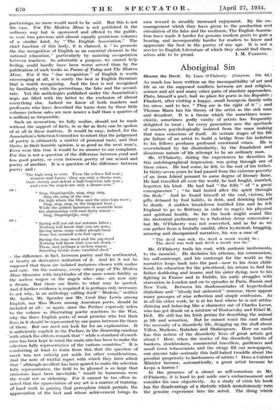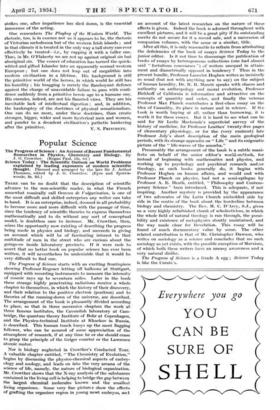Aboriginal Sin
Shame the Devil. By Liam O'Flaherty. (Grayson. 10s. ed.)
As much has been written on the incompatibility of art and life as on the supposed conflicts between art and religion, science and art and many other pairs of absolute approaches. Plato, himself a poet, had no place for poets in his Republic ; Flaubert, after visiting a happy, small bourgeois family with his niece, said to her, " They are in the right of it " ; and Thomas Mann has his theory of the artist as the sick man and decadent. It is a theme which the sometimes maso- chistic, sometimes godly vanity of artists has frequently delighted to treat ; for every generation sees the spectacle of masters psychologically isolated from the mass making that mass conscious of itself. At certain stages of his life the failure of an artist to build a bridge from his isolation to his fellows produces profound emotional crises. He is overwhelmed by his dissimilarity, by the fraudulent and disastrous nature of his attempt to be an ordinary man.
Mr. O'Flaherty, during the experiences he describes in this autobiographical impression, was going through one of these crises. He had come, he felt, to the end of his tether. In thirty-seven years he had passed from the extreme poverty of an Aran Island peasant to some degree of literary fame. He had travelled all over the world, he had fought, married, begotten his kind. He had had " the folly " of " a great concupiscence " ; "he had lusted after the spirit through the flesh." And he found himself at the end, vicious, his gifts debased by foul habits, in debt, and drinking himself to death. A sudden breakdown terrified him and he left England to go to Brittany in order to regaia his physical and spiritual health. So far the book might sound like the rhetorical preliminary to a Salvation Army conversion ;. but Mr. O'Flaherty was not converted, and as far as we can gather from a brutally candid, often hysterical, bragging, amusing and disorganized narrative, his was a case of
" The devil was sick, the devil a monk would be ; The devil was well and devil a monk was he."
Mr. O'Flaherty trails his coat, with sardonic incitements, to the moralist. He declaims his atheism, his communism, his self-contempt, and his contempt for the world as the narrative loops back into the past—now to his Aran child- hood, his education for the priesthood, his return to find his father doddering and insane, and his sister dying, now to his fighting in France and in Dublin, his early struggles with starvation in London and on to episodes in Paris, Russia and. New York. Between his rhodomontades of hyperbolical diabolism and " bloody but unbowed " remorse, there appear many passages of wise reflection and simple confession. As, in all his other work, he is at his best where he is not attitu- dinizing and behaving like a character out of Charles Lever, who has got drunk on a mixture of Dostoevsky and Ethel M. Dell. He still has his Irish genius for describing the animal in life and sensation. But he cannot resist the cant about the necessity of a diorderly life, dragging up the stuff about Villon, Marlowe, Rabelais and Shakespeare. How on earth has this notion of the disorderly lives of great artists got about ? How, when the stories of the disorderly habits of bankers, stockbrokers, commercial travellers, gardeners and small town tobacconists and the clergy fill our newspapers, can anyone take seriously this half-baked twaddle about the peculiar propensity to lawlessness of artists ? Does a Cabinet Minister become, automatically, a great artist because he keeps a harem ?
In the presence of a sinner as self-conscious as Mr. O'Flaherty, it is hard to put aside one's embarrassment and consider his case objectively. As a study of crisis his book has the disadvantage of a rhetoric which monotonously' runs the genuine experience into the acted. The thing. which
strikes one, after impatience has died down, is the essential innocence of the acting.
One remembers The Playboy of the Western World. The rhetoric, too, is in essence not as it appears to be, the rhetoric of Victorian melodrama but of the western Irish islands ; and in that climate it is treated in the only way a tall story can ever effectively be treated—i.e., by capping it with a taller one. Thus, in Mr. O'Flaherty we are not up against original sin but aboriginal sin. The veneer of education has turned the quick- witted and gifted Islander into an apparently normal western European ; but one does not leap out of megalithic into modem civilization in a lifetime. His background is still the primitive world of the heroes, in which world he still has his humility ; his bragging is merely the flamboyant defence against the charge of unavoidable failure to pass with confi- dence suddenly from a primitive heroic age to a htunarte one. His enemies, indeed, are not his flaunted vices. They are his inevitable lack of intellectual digestion ; and, in _addition, the bankruptcy of the doctrines of physical sensationalism. One can do, no . more, under these doctrines, than create stronger, bigger, wider and more hysterical men and women, and pander to a decadent civilization's pathetic hankering after the primitive. V. S. PRITCHETT.













































 Previous page
Previous page